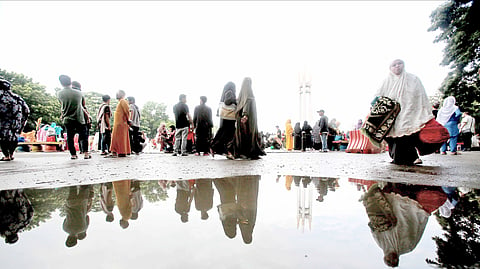
- NEWS
- the EDIT
- COMMENTARY
- BUSINESS
- LIFE
- SHOW
- ACTION
- GLOBAL GOALS
- SNAPS
- DYARYO TIRADA
- MORE

As the sun rises on the morning of Eid al-Adha, the atmosphere in Muslim communities around the world yesterday was filled with a sense of reverence, joy, and unity.
The annual Islamic festival, also known as the “Festival of Sacrifice,” commemorates the prophet Ibrahim’s (Abraham in Judeo-Christian traditions) unwavering faith and his readiness to sacrifice his son Ismail (Ishmael) as an act of obedience to God.
Just as Ibrahim was about to perform the act, God provided a ram to sacrifice instead, signifying a profound moment of divine mercy and faith.
But what exactly is Eid al-Adha about, and how do Muslims celebrate it?
In several Muslim communities worldwide, the day begins with communal prayers. Thousands of worshippers gather early in the morning at the mosque, dressed in their finest attire.
The Imam’s voice echoes through the loudspeakers, leading the congregation in a special prayer that marks the start of the festival.
“Eid al-Adha is a time for us to reflect on the sacrifices Prophet Ibrahim was willing to make for his faith,” Bai Maylen Mamadsual, a 29-year-old Muslim based in Davao, told DAILY TRIBUNE in a Viber message.
“It’s a humbling reminder of the importance of putting our faith first, even in the face of immense difficulty,” Mamadsual added.
The centerpiece of Eid al-Adha is a ritual called Qurbani, which involves sacrificing a sheep, goat, cow, or camel.
Thrice cut
The meat is then divided into three parts: one-third for the family, one-third for relatives and friends, and one-third for the poor and less fortunate.
The practice embodies the spirit of Eid al-Adha — sharing blessings and fostering a sense of community.
“Qurbani is a beautiful act of charity,” Kleanne Pendatun, a Muslim based in Kidapawan, told this paper. “Knowing that our sacrifice will help those in need brings immense joy to the celebration.”
The festivities of Eid al-Adha begin with Eid prayers, a special congregation held on the morning of Eid. Muslims dress in their finest attire, often new clothes symbolizing a fresh start.
The prayers are followed by joyous greetings of “Eid Mubarak” (Blessed Eid) exchanged among loved ones.
“Eid al-Adha is a time for families to come together,” says Sarah Ali, a mother of two. “We visit our elders, exchange gifts, and enjoy delicious meals together.”
Homes are filled with the aroma of traditional Eid delicacies. Depending on the region, these may include savory dishes like biryani or lamb stew, and sweet treats like baklava or kunafa. Children often receive new clothes and Eidi (gifts of money) from elders, adding to the festive spirit.
Communal meals
The celebrations extend beyond the immediate family. Muslims often visit the homes of neighbors, friends, and extended relatives, strengthening social bonds and fostering a sense of community.
Many mosques and Islamic centers organize communal meals and gatherings, ensuring that everyone has the opportunity to celebrate and share in the joy of Eid.
“Eid al-Adha is a reminder that we’re all part of a larger family,” said Mamadsual. “It’s a time to bridge differences, forgive past transgressions, and strengthen our bonds with one another.”
The spirit of Eid al-Adha transcends religious boundaries. Many Muslims extend Eid greetings and share meals with people of other faiths, fostering interfaith dialogue and understanding.
“Eid al-Adha is a celebration that goes beyond religion,” says Pendatun. “It’s a message of sacrifice, sharing, and compassion that resonates with everyone.”
